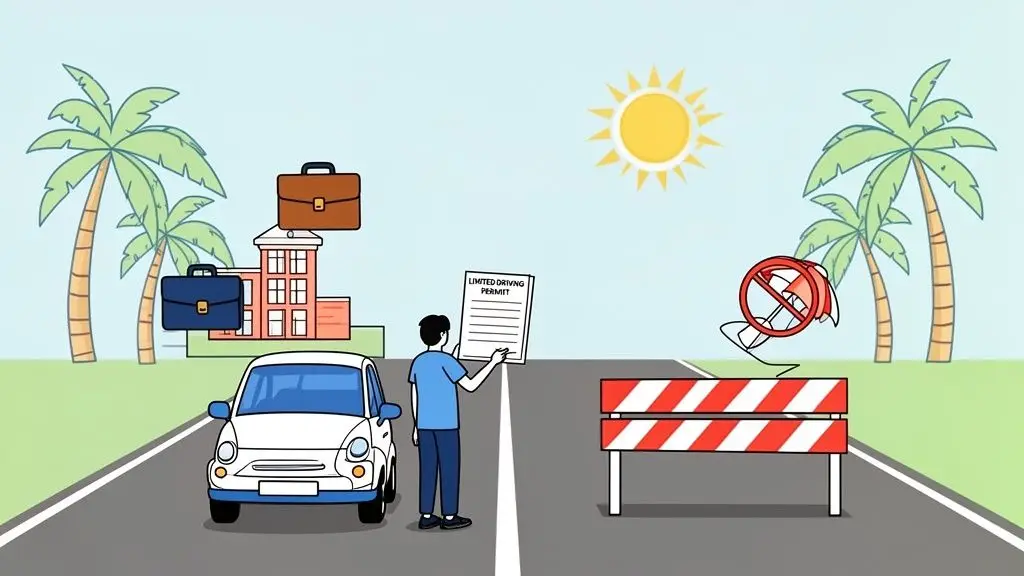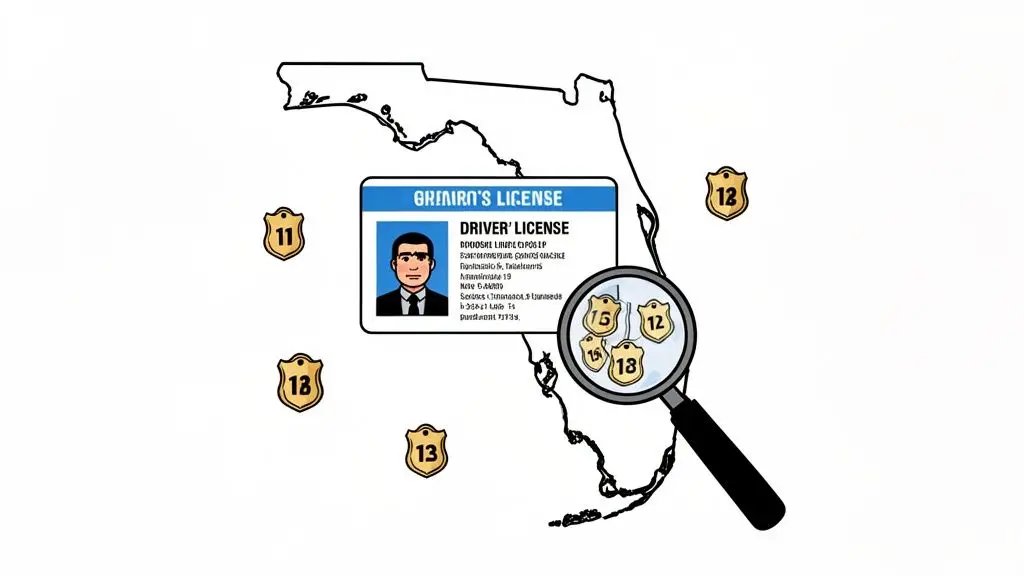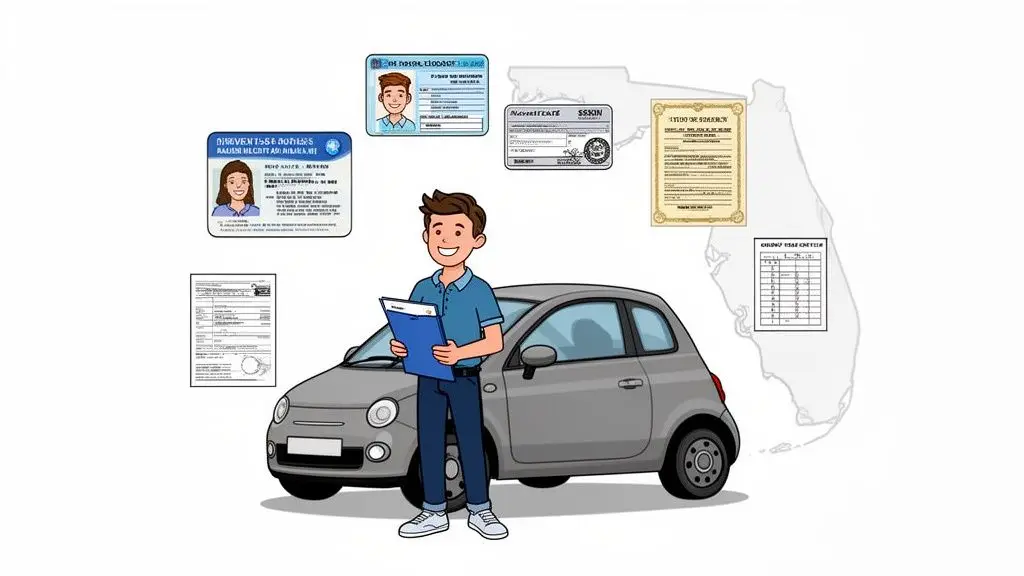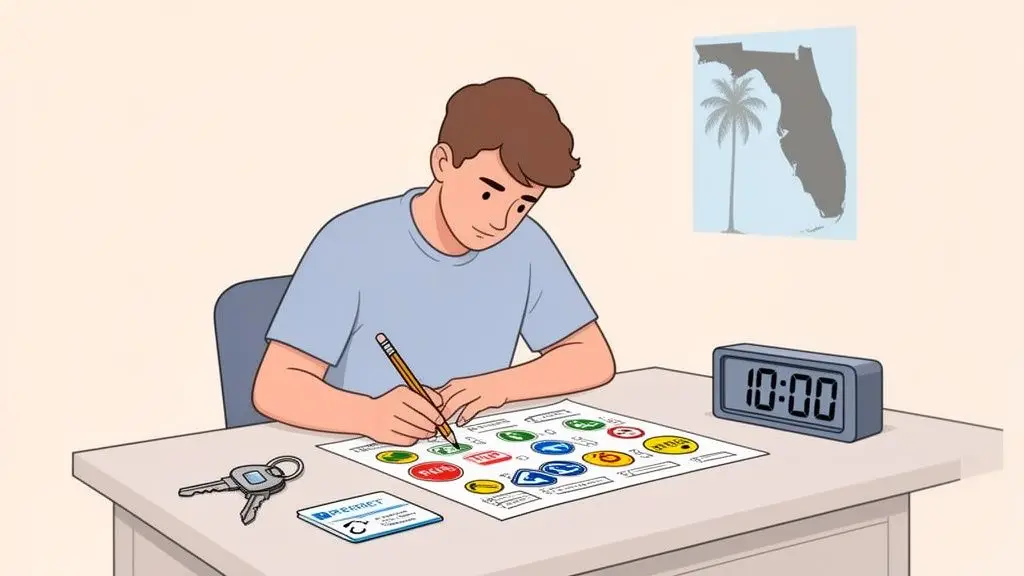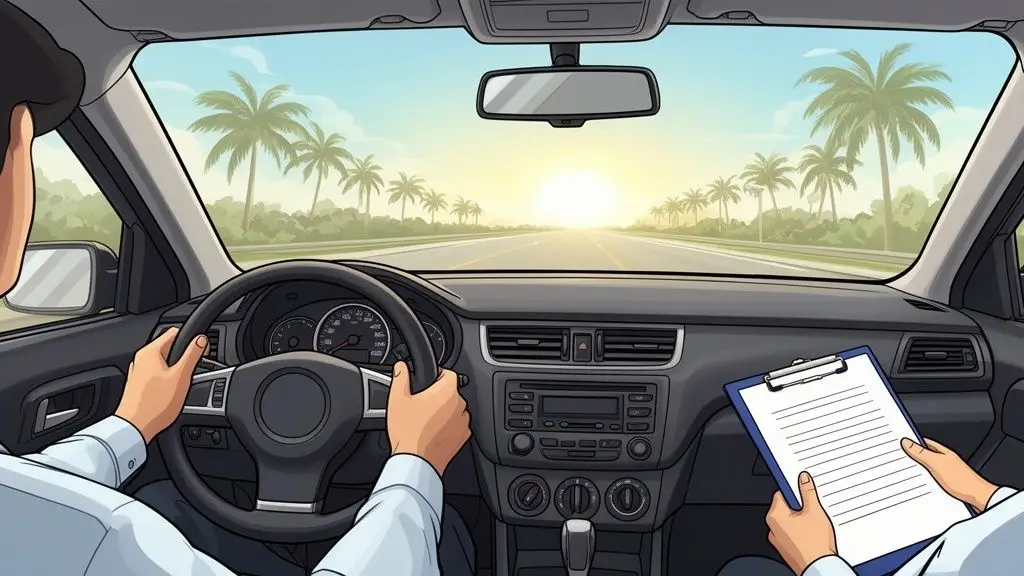So, you’ve been pulled over and now you’re holding a Florida traffic ticket. That piece of paper sets a clock ticking: you have just 30 days to decide what to do next.
This isn’t just about paying a fine. The choice you make will directly impact your driving record, your insurance rates, and even your wallet down the road. It’s a critical decision point, and understanding your options is the first step to making the right call.
Your Immediate Options After a Traffic Violation
Seeing those flashing lights is nerve-wracking, but the aftermath doesn’t have to be a mystery. Once that citation is in your hand, you’re at a fork in the road with three distinct paths. Each one leads to a very different destination.
Ignoring the ticket, by the way, isn’t one of those paths. That’s a surefire way to get your license suspended and rack up even more fees. Your best bet is to face it head-on by choosing one of the following routes.
The Three Paths You Can Take
It’s tempting to just pay the fine and be done with it, but that’s often the most expensive choice in the long run. Let’s break down the three real options you have in that 30-day window.
- Path 1: Pay the Fine. This is the fastest route, but it’s an admission of guilt. When you pay, you get a conviction on your permanent driving record, points on your license, and almost certainly a hike in your insurance premiums.
- Path 2: Elect Traffic School. For most people, this is the smartest play. By completing a state-approved BDI course, you can often get the points dismissed and, crucially, stop your insurance company from raising your rates because of the ticket.
- Path 3: Fight the Ticket in Court. If you’re confident the ticket was issued in error, you have every right to plead not guilty. This means going before a judge to argue your case. Win, and the ticket vanishes as if it never happened.
This decision tree infographic gives a great visual breakdown of what happens with each choice.
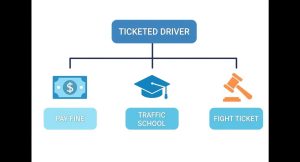
As you can see, your initial move sets off a chain reaction. If you’re trying to figure out if your ticket qualifies for the traffic school option, it helps to understand what is a moving violation in the first place.
To make things even clearer, let’s quickly summarize your choices.
Your Three Immediate Choices After a Florida Traffic Ticket
| Your Option | What It Involves | The Main Result |
|---|---|---|
| Pay the Fine | Sending in payment for the full amount of the citation. | You admit guilt, get points on your license, and your insurance rates will likely increase. |
| Elect Traffic School | Notifying the clerk of court you’ll take a BDI course and paying the fine. | The conviction is “withheld,” meaning no points and no insurance increase. |
| Fight It in Court | Pleading not guilty and scheduling a court date to contest the ticket. | If you win, the ticket is dismissed. If you lose, you face the fine, court costs, and points. |
This table lays it all out. The path you choose really depends on your specific situation and what you’re trying to protect—your time, your money, or your driving record.
And if getting a ticket makes you feel singled out, don’t. You’re in good company. An estimated 41 million drivers get a speeding ticket every single year in the U.S. While the average fine hovers around $150, the real cost—factoring in insurance hikes and other fees—can be much, much higher.
Understanding the True Cost of a Florida Traffic Ticket
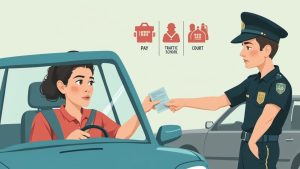
When an officer hands you a traffic ticket, the first thing your eyes land on is the fine. But that dollar amount? It’s just the beginning. The real cost of a Florida traffic ticket isn’t a one-time payment—it’s a financial ripple effect that can mess with your budget for years to come.
Think of it as an unexpected bill that keeps compounding. The initial fine is just the starting price. The serious financial pain comes from the long-term consequences for your driving record and, more importantly, your car insurance premiums. What feels like a minor headache today can easily turn into a major expense for the next 3 to 5 years.
Your Driving Record is a Financial Scorecard
Florida uses a “points system” to track your driving, and it’s best to think of it as a credit score for your habits behind the wheel. Just like late payments can tank your FICO score and make loans more expensive, traffic violations add points to your license. To insurance companies, those points scream “higher risk.”
Here’s the thing: when you pay a fine for a moving violation, you’re officially pleading guilty. That conviction goes on your permanent driving record, and the Florida Highway Safety and Motor Vehicles (FLHSMV) tacks on demerit points. The more serious the mistake, the more points you get.
The accumulation of points is the main trigger for two major penalties: jacked-up insurance rates and a potential license suspension. A clean record is your best shield against soaring premiums.
These points aren’t just numbers on a screen; they carry real financial weight. Insurance providers check driving records all the time, and a fresh batch of points is a massive red flag. This almost always leads to a hefty hike in your annual insurance costs.
How Different Violations Impact Your License
The number of points you get depends entirely on the severity of the offense. Understanding how this works is key to grasping the full picture. A minor speeding ticket, for example, carries a much different weight than a reckless driving charge.
Let’s take a look at how some common violations stack up in the points system.
| Violation Type | Typical Fine Range | Points Added to License |
|---|---|---|
| Speeding (15 MPH or less over limit) | $130 – $280 | 3 points |
| Speeding (16 MPH or more over limit) | $200 – $380 | 4 points |
| Running a Red Light | $160 – $260 | 3 points |
| Reckless Driving | $500 – $1,000 | 4 points |
| Leaving Scene of an Accident (with damage) | Up to $500 | 6 points |
As you can see, a simple mistake can add points quickly, and they all add up. This is where the real danger to your driving privileges begins.
The Point System and License Suspension
The FLHSMV has very clear, strict limits on how many points you can rack up before your driving privileges are suspended. It’s a straightforward system designed to get drivers who pose a consistent risk off the road.
Here are the suspension thresholds you need to know:
- 12 points within a 12-month period = 30-day suspension
- 18 points within an 18-month period = 3-month suspension
- 24 points within a 36-month period = 1-year suspension
Suddenly, that single 3-point ticket looks a lot more serious. It pushes you closer to a threshold where one more mistake could mean losing your license, completely disrupting your ability to get to work, school, or anywhere else. This is why knowing the connection between traffic ticket points and insurance is so critical for protecting your finances.
Choosing to Pay the Fine and Accept the Consequences

So you’re staring at that traffic ticket, and the first thought that pops into your head is probably, “Let me just pay this and be done with it.” It feels like the path of least resistance, the quickest way to make the problem disappear.
But here’s the thing: paying a traffic ticket in Florida isn’t like paying your water bill. It’s an official legal action. When you pay that fine, you are legally admitting guilt. This one simple act kicks off a series of consequences that can follow you for years, hitting both your driving record and your bank account.
Once you plead guilty by paying, the state records an official conviction for a moving violation on your Florida driving history. And that mark is permanent.
The Immediate Aftermath of Pleading Guilty
The moment that conviction hits your record, the Florida Highway Safety and Motor Vehicles (FLHSMV) automatically adds demerit points to your license. This isn’t a maybe; it’s a certainty.
Think of it as a direct cause-and-effect. Paying the fine is the cause. The effect? A guaranteed addition of anywhere from three to six points, depending on what you were ticketed for.
By simply paying the ticket, you are trading short-term convenience for long-term penalties. The conviction and points become the primary triggers for the most expensive consequence of all: a significant increase in your auto insurance premiums.
This is where the real cost of that “simple” ticket starts to add up, and it’s almost always far more than the original fine.
How a Conviction Hits Your Wallet
Insurance companies don’t just set your rate and forget it. They regularly check your driving record, and when they spot a new conviction and fresh points, red flags go up. To them, you’ve just become a riskier driver—someone more likely to get into an accident.
Their response is predictable: they raise your rates. And this isn’t just a temporary bump. You can expect that premium hike to stick around for three to five years, potentially costing you hundreds, if not thousands, of dollars over time. That $150 speeding ticket can quickly morph into a $1,000+ problem.
Let’s lay out the hidden costs of just paying the fine:
- Permanent Conviction: The violation is stamped onto your official Florida driving record for good.
- Automatic Points: You will get points on your license, moving you closer to a possible suspension.
- Increased Insurance Rates: Your premiums are almost certain to go up and stay up for years.
- Loss of Options: The second you pay, you forfeit your right to elect traffic school or contest the ticket in court.
Paying the fine might feel like an easy out, but it’s a decision that locks in the worst possible long-term outcomes. Before you send that check or click “pay now,” you need to be fully aware of what you’re agreeing to.
Using Traffic School to Protect Your Driving Record
Getting a traffic ticket can feel like you’re caught between a rock and a hard place. Do you just pay the fine and admit guilt? Or do you take your chances fighting it in court? Thankfully, for most Florida drivers, there’s a third, much smarter path.
Think of electing traffic school as hitting a reset button on your violation. This option, officially known as a Basic Driver Improvement (BDI) course, is a proactive way to shield both your driving record and your wallet. It’s a strategic move that stops a minor mistake from snowballing into a long-term financial headache.
Choosing this route keeps points off your license, prevents your insurance rates from jumping, and keeps a conviction off your record. Honestly, it’s the single best way to handle the fallout from a common traffic ticket.
The Power of Withholding Adjudication
So, how does this all work? The real magic behind the traffic school option is a legal term called “adjudication withheld.” Understanding this is key.
When you just pay a ticket fine, the court finds you guilty. That conviction goes right onto your permanent record. But when you complete a BDI course, the court agrees to hold back on that judgment. It’s like the violation gets put on pause and is never officially finalized.
By withholding adjudication, the court agrees not to report the violation as a conviction to the FLHSMV. This is huge because it means no points are added to your license. And, thanks to Florida law, your insurance company can’t raise your rates or drop your coverage because of that specific ticket.
That’s a massive win. You keep your driving record clean and your insurance affordable, all for the small price of a few hours in an online course.
Step by Step: How to Elect Traffic School
The process is a lot simpler than you might imagine. You can usually handle the whole thing without ever having to step inside a courtroom.
Here’s how it breaks down:
- Notify the Clerk of Court: You have a 30-day deadline from when you got the ticket. Before it’s up, you have to let the clerk of court in that county know you want to attend traffic school. This is usually something you can do online, by mail, or in person.
- Pay the Required Fine: Electing traffic school doesn’t make the fine disappear—you still have to pay it. What it does do is prevent all the other nasty consequences.
- Enroll in and Complete the Course: After telling the court and paying the fine, the clock starts. You’ll typically have 60 to 90 days to finish a state-approved BDI course. It’s best to find a flexible, state-certified program, and you can easily enroll in an approved traffic school online that works with your schedule.
- Submit Your Certificate of Completion: Once you finish, you’ll get a certificate. You must get this proof to the clerk of court before your deadline. The good news is that many online schools will even submit it for you electronically.
Once the court gets your certificate, your case is officially closed. The violation is marked as “adjudication withheld,” and you can move on with a clean slate.
Who Is Eligible for This Option?
While traffic school is an incredible tool, it’s not available for everyone or every situation. It’s mainly for non-criminal moving violations, and a few rules apply.
Generally, you can elect to take a traffic school course if:
- You haven’t attended a BDI course in the past 12 months.
- You haven’t already used this option five times in your lifetime.
- You do not hold a Commercial Driver’s License (CDL), as commercial drivers fall under different federal regulations.
This option was created for the everyday driver who makes an honest mistake now and then. It gives you a fair chance to learn from it without it costing you a fortune down the road.
Fighting Your Ticket in Traffic Court
Sometimes, you get a ticket and you just know it isn’t right. Maybe a speed limit sign was completely blocked by an overgrown tree, or you’re positive that light was yellow, not red. If you genuinely believe the officer made a mistake, you absolutely have the right to fight that ticket in court.
Deciding to fight is a much bigger step than just paying the fine or signing up for traffic school. When you go this route, you’re officially pleading “not guilty” and preparing to argue your case in front of a judge. The best-case scenario? The ticket gets thrown out completely. But it’s a gamble, and you need to be aware of the risks.
What to Expect in the Courtroom
Contesting a ticket means you’re asking for a hearing. Don’t picture a dramatic jury trial from a TV show; it’s usually a much simpler proceeding with just you, the officer who wrote the ticket, and the judge. The officer will go first, explaining their side and why they issued the citation.
Then, it’s your turn. This is your moment to tell your side of the story. You can present evidence like photos of the scene, diagrams, or even call witnesses. You also get to cross-examine the officer, asking questions about their observations. The whole point is to introduce a little bit of reasonable doubt about whether you actually committed the violation.
A winning strategy in traffic court often comes down to poking holes in the evidence. Was the officer’s radar gun recently calibrated? Did they have a clear, unobstructed view? Raising questions about these key details is usually far more effective than just saying, “I didn’t do it.”
Be warned, though: losing in court usually comes with the stiffest penalties. You’ll be on the hook for the full fine plus court costs, and the points will be slapped on your license—with no chance to take traffic school to remove them. It’s a high-stakes move, so think it through carefully. Our guide on how to contest a traffic ticket in Florida walks you through how to prepare a solid case.
Building Your Defense and Deciding on a Lawyer
A good defense often zeroes in on the technical details. For example, you could challenge the method the officer used to clock your speed or question if the visibility was poor at the time. Evidence is also getting more complex.
By 2025, many areas are rolling out AI-powered cameras that track driver behavior with incredible accuracy, providing data for city planning and fair enforcement. This shift means a ticket might not just be one officer’s word against yours anymore; it could involve complex tech.
With all this in mind, hiring a professional might be the smartest move. A local traffic attorney lives and breathes the court system. They know the judges, they know what arguments work, and they can often handle the entire process without you ever having to step foot in the courthouse. While traffic law is a specialty, you can get a general sense of what to look for by reading up on how to choose a personal injury attorney. Having an experienced lawyer in your corner can dramatically increase your chances of a dismissal or getting the charge reduced.
Here’s the thing: out of all the moves you can make after getting a ticket, doing nothing is by far the worst. Seriously. Every other option has its ups and downs, but simply ignoring your citation is a one-way ticket to a world of legal and financial pain. This isn’t just putting something off—it’s actively choosing a path that sets off a chain reaction of harsh penalties.
In Florida, the clock starts ticking the moment that ticket is in your hand. You have a strict 30-day deadline to either pay it, elect traffic school, or tell the court you plan to fight it. Letting that window slam shut isn’t an option the state takes lightly. It’s seen as a direct failure to comply, and the system is designed to respond automatically and without much sympathy.
How a Simple Fine Morphs into a Suspended License
The second you pass that 30-day mark, the clerk of court sends a little notice over to the Florida Highway Safety and Motor Vehicles (FLHSMV). The immediate consequence? Your driver’s license gets suspended. There’s no gentle reminder or grace period. It just happens.
And let’s be clear, driving on a suspended license in Florida is a criminal offense. If you get pulled over again, you’re not just looking at another ticket; you could be facing jail time and fines that make the original citation look like pocket change. This is exactly how a minor traffic mistake spirals into a major legal headache.
Think of a “Failure to Appear” as more than just a missed deadline. In the eyes of the court, it’s you thumbing your nose at a legal order. That instantly escalates the entire situation, tacking on a whole new set of penalties.
This issue is only becoming more common. With roads getting more crowded, frustration behind the wheel is on the rise. Just look at a city like Los Angeles, where drivers wasted an average of 87 hours in traffic in 2024 alone. As you can read more about these global traffic trends, it’s obvious that the odds of getting a ticket are increasing for everyone. That makes knowing how to handle one correctly more critical than ever.
The Financial Snowball Effect
If the threat of a suspended license isn’t enough, ignoring a ticket also kicks off a financial avalanche. The court will immediately tack on late fees and other penalties, which can dramatically inflate what you owe.
Before you know it, that debt is handed over to a collections agency. Now you’re dealing with their fees on top of everything else, not to mention the damage this does to your credit score. What began as a hundred-dollar problem can easily swell into a debt several times that size. To get your license back, you’ll have to clear every single one of these hurdles:
- The original ticket fine
- All court-imposed late fees and administrative costs
- Any fees charged by the collections agency
- The official license reinstatement fee paid to the FLHSMV
The good news? Avoiding this mess is incredibly simple. Just take action within your 30 days. Whether you pay the fine, sign up for traffic school, or head to court, making a choice is the only way to resolve your ticket and sidestep these brutal consequences.
Common Questions About Florida Traffic Tickets
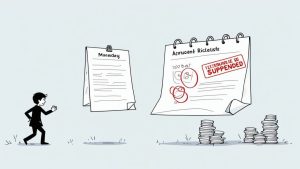
Even after you understand the basic options, getting a traffic ticket always brings up more specific questions. Florida’s traffic laws have plenty of nuances that can be tricky to navigate, so let’s walk through some of the things drivers ask us about the most.
Getting a straight answer is the first step to making the best decision for your situation. Here are some clear, practical responses to the questions we hear all the time.
Can I Use Traffic School for a Speeding Ticket in Florida?
Yes, for most speeding tickets, you absolutely can. Florida law allows drivers to take a Basic Driver Improvement (BDI) course for non-criminal moving violations, and that covers the vast majority of speeding citations. It’s a fantastic way to keep points from ever hitting your license.
But you have to be eligible. The option is off the table if you were ticketed for going 30 MPH or more over the speed limit. You also need to meet the general requirements: you can’t have taken a traffic school course in the past 12 months, and you can only use this option five times in your entire life.
How Long Do Points Actually Stay on My Florida License?
This is a common source of confusion, so it helps to think about it in two parts. First, for historical record-keeping, the points from a violation technically stay on your complete driving history forever.
The timeframe that really matters, though, is how long those points count toward a license suspension. For that purpose, points are only active for 36 months (3 years). For example, the state will suspend your license if you rack up 12 points in 12 months. After three years, those specific points expire and no longer count toward that suspension total.
While points become inactive for suspension purposes after three years, your insurance company might still factor in older violations when they set your rates. A clean record over the long haul is always your best bet financially.
What Happens If I Get a Ticket in Florida with an Out-of-State License?
Whatever you do, don’t just ignore it and hope it goes away. Florida will report the ticket to your home state’s DMV through a national database called the Driver License Compact, an agreement between states to share this kind of information.
Once your home state gets the notification, they’ll usually apply their own rules and point system to the offense. That means you could get points on your out-of-state license just as if the ticket happened right in your hometown. It’s critical to handle the Florida ticket correctly to avoid a headache back home.
Is It Worth Hiring an Attorney for a Minor Traffic Ticket?
It really depends on your specific situation and what’s on the line.
For a routine, minor ticket where you’re eligible for traffic school, it’s almost always cheaper and easier to just elect the school yourself. That route is a guaranteed way to get no points and avoid an insurance hike.
However, hiring a traffic attorney can be a smart move in a few key scenarios:
- You have a Commercial Driver’s License (CDL), and a conviction could threaten your job.
- You’re at risk of a license suspension because you already have other points on your record.
- The ticket is for a more serious violation, like reckless driving.
An experienced attorney can often negotiate a better deal, find a reason to get the ticket dismissed, or fight for you in court, potentially saving you from much harsher consequences.
Dealing with a traffic ticket can be stressful, but you don’t have to figure it out alone. If you’re eligible, choosing traffic school is the most reliable way to protect your driving record. At BDISchool, we provide a state-approved, 100% online course that makes it simple to satisfy the court’s requirements on your own time. Keep points off your license and stop insurance rates from climbing by enrolling today at https://bdischool.com.
